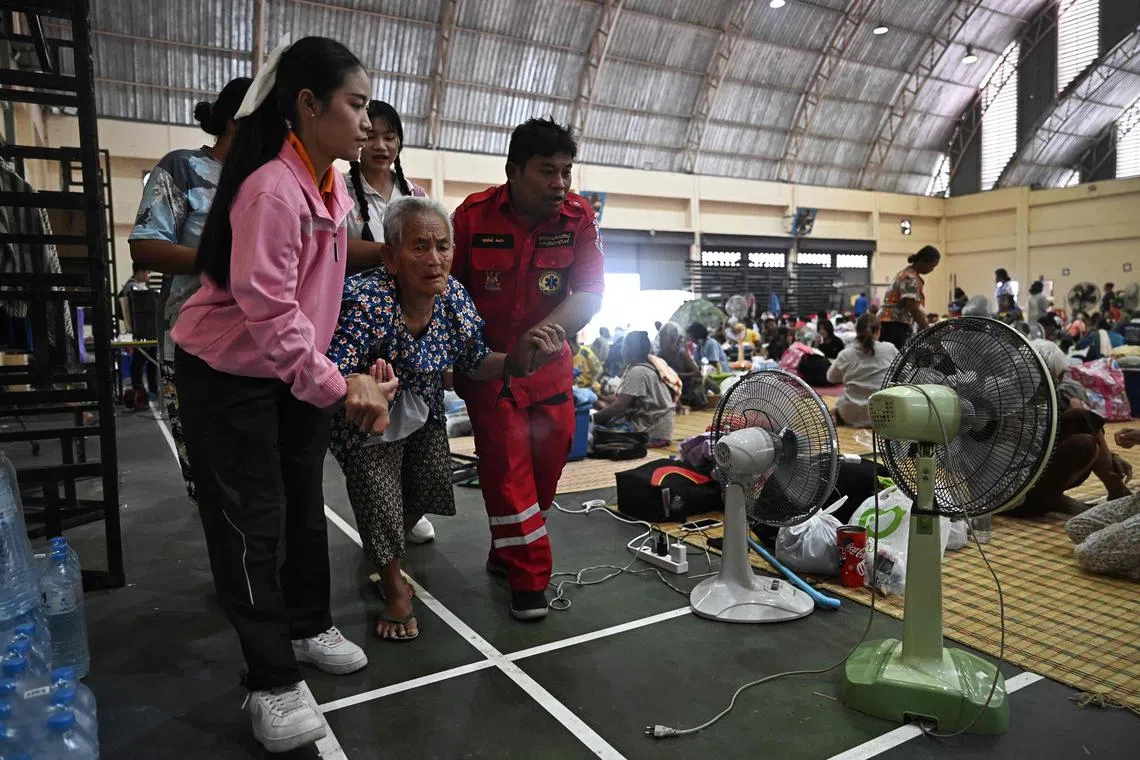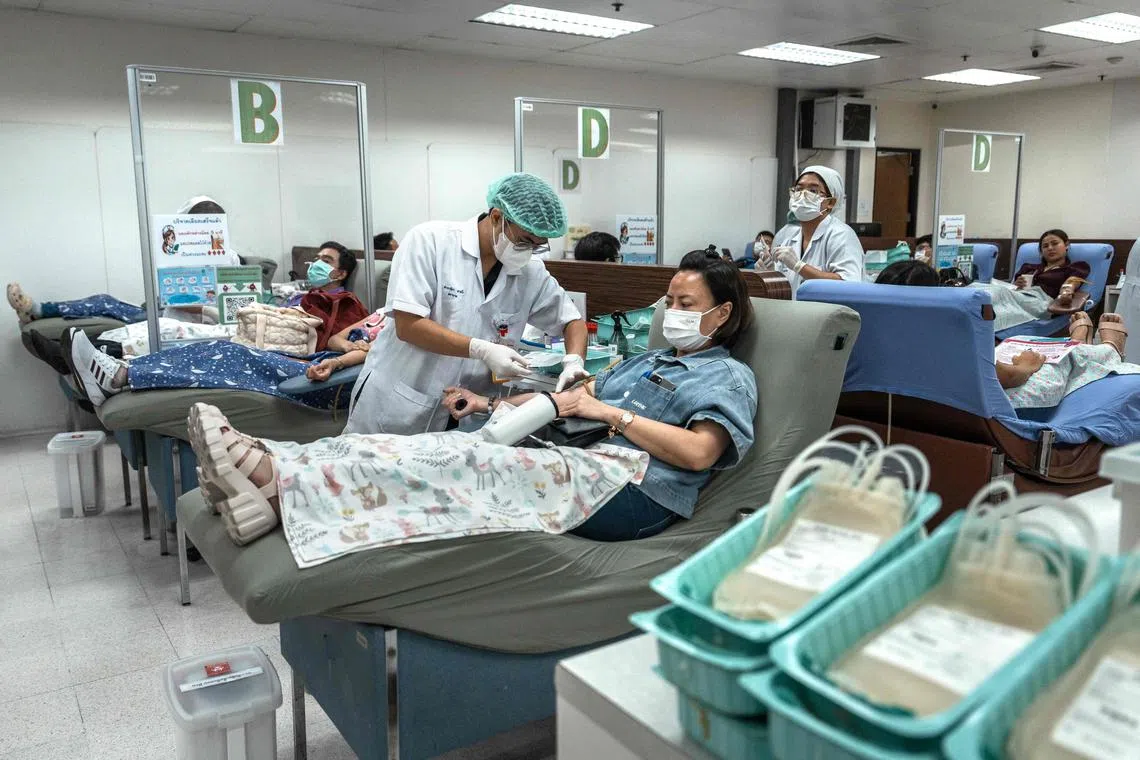Thai government unveils extensive financial relief for border conflict victims
Sign up now: Get ST's newsletters delivered to your inbox

More than 100,000 people have fled the bloodiest border fighting between Thailand and Cambodia in a decade, Bangkok said on July 25.
PHOTO: AFP
Follow topic:
BANGKOK - The Thai government has announced a comprehensive package of relief measures for individuals and officials affected by the recent escalation of conflict along the Thai-Cambodian border
The announcement comes as ministries coordinate a wide-ranging response, including financial assistance and a significant diplomatic downgrade.
Mr Jirayu Huangsap, spokesman for the Prime Minister’s Office, confirmed that interim Prime Minister Phumtham Wechayachai, who also serves as Deputy Prime Minister and Interior Minister, has instructed relevant agencies to swiftly compile casualty figures.
This includes details of citizens and personnel killed, injured, and those who suffered property damage. This information will then be sent to the provincial authorities to finalise numbers for immediate financial compensation and relief.
The Disaster Relief Fund Committee under the Prime Minister’s Office on July 25 approved compensation for citizens, civil servants, military personnel, police officers and border patrol soldiers affected by the conflict:
1 million baht (S$39,600) for deaths
700,000 baht for permanent disabilities
200,000 baht for serious injuries
100,000 baht for moderate injuries
50,000 baht for minor injuries
“The government expressed deep concern and heartfelt condolences for the victims and instructed relevant agencies to expedite assistance for the affected families, both in terms of livelihood and psychological support,” said Deputy Prime Minister Pirapan Salirathavibhaga.
“The government also extended its condolences to the families of the deceased and offered support to those impacted by the incident.”
He also encouraged the public to contribute to the Disaster Relief Fund via tax-deductible donations.

An elderly evacuee is assisted as they take shelter in a gymnasium on the grounds of Surindra Rajabhat University in the Thai border province of Surin on July 25, 2025.
PHOTO: AFP
Initial aid will be drawn from the Prime Minister’s Office Fund to provide immediate relief, with further comprehensive measures to be rapidly assessed and returned to the Ministry of Interior and Prime Minister’s Office for approval.
The Ministry of Finance has mandated specialised financial institutions to implement emergency financial measures aimed at alleviating hardship caused by the border unrest.
These initiatives encompass debt moratoria, reduced interest rates, and the provision of low-interest loans.
Deputy Prime Minister and Finance Minister Pichai Chunhavajira stated that the unrest has severely impacted the safety and well-being of local residents, with significant economic and social repercussions for surrounding communities.
The conflict has led to considerable property damage and severely disrupted the livelihoods and businesses of people in the affected areas
Acknowledging these severe impacts, the government has prioritised urgent care for its citizens, instructing various financial institutions to implement a broad spectrum of relief measures.

People donate blood at the National Blood Center of the Thai Red Cross Society in Bangkok on July 25, 2025.
PHOTO: AFP
The Ministry of Finance affirmed its commitment to mitigating the conflict’s impact, ensuring that affected citizens and businesses have adequate access to funding for their livelihoods, operations, and recovery.
These comprehensive measures are designed to reach a wide range of beneficiaries, including farmers, small entrepreneurs, and the general public, aiming to reduce costs, enhance liquidity, and support the repair and restoration of assets to enable efficient business resumption.
Affected individuals can apply for assistance through the relevant financial institutions immediately, with the Ministry of Finance closely monitoring the situation to introduce further appropriate measures as needed.
Key financial support initiatives include:
Government Savings Bank (GSB): Offering principal payment deferment until December 2025 for affected individuals (with partial interest payments), along with two low-interest retail loan programmes and a specific loan scheme for SMEs, including fee waivers
Bank for Agriculture and Agricultural Cooperatives (BAAC): Providing emergency expense loans up to 50,000 baht (S$1,980) (for farmers, with a 6-month interest grace period) and rehabilitation loans up to 500,000 baht for repairs and quality of life improvement
Government Housing Bank (GHB): Introduced a 200 million baht project offering highly preferential interest rates (as low as 0.01 per cent per annum) for borrowers with severe injuries, permanent disabilities, or damaged/destroyed homes
Small and Medium Enterprise Development Bank of Thailand (SME D Bank): Launched a “Pause, Reduce, Extend, Add” programme for affected SMEs, including principal payment suspensions, reduced instalments, extended repayment periods, and low-interest capital loans
Export-Import Bank of Thailand (EXIM Thailand): Providing urgent relief measures such as extended debt repayment periods, reduced interest rates, and increased temporary credit lines, alongside various liquidity and cost reduction measures for new market entry and export support
Islamic Bank of Thailand (IBank): Implemented “IBank Never Leaves You” measures, offering principal and profit payment suspensions and additional funding for home and business rehabilitation with favourable profit rates
Thai Credit Guarantee Corporation (TCG): Offering payment deferrals for guarantee fees and instalments for existing clients, and new credit guarantee schemes (SMEs Power Trade & Biz, SMEs Micro Biz) worth billions of baht to provide crucial liquidity
In response to the volatile border situation, several key ministries have been issued specific directives:
Ministry of Education: Ordered the temporary closure of schools in high-risk areas
Ministry of Public Health: Transformed local hospitals into temporary field hospitals and successfully evacuated all patients and injured individuals to safer facilities
Ministry of Social Development and Human Security: Tasked with overseeing initial relief efforts and basic humanitarian assistance
Ministry of Digital Economy and Society: Instructed to monitor and correct the spread of false information related to the situation
Ministry of Interior: Directed to collaborate with the military in affected areas to ensure comprehensive public care
On the diplomatic front, the government has confirmed a downgrade in relations with Cambodia.
The Ministry of Foreign Affairs has been instructed to recall Thailand’s Ambassador to Cambodia and to send the Cambodian Ambassador to Thailand back to Phnom Penh
Mr Jirayu described this as “the most severe measure in diplomacy”. THE NATION/ASIA NEWS NETWORK

